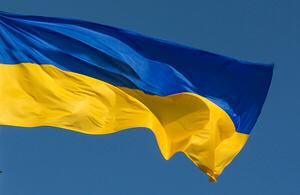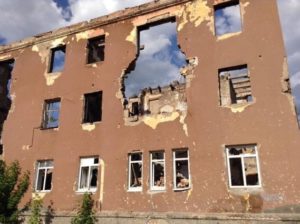6th June 2022 Belgrade, Serbia
Russia’s war in words and numbers

What is happening in Ukraine can be no less shocking to people in Serbia than to people in Canada, Norway, Poland, the UK – or anywhere else including Russia, when and where the truth is known.
Deliberate disinformation has been rife and multifaceted – from mundane lies (no intention of invading Ukraine) to fantasy fiction (bats, birds and bio weapons). So what are the facts?
Russia’s invasion of Ukraine: numbers
In 2014 Russia illegally annexed Crimea by military means. From 2014 Russia stirred up conflict in the Donbas, arming and directing so-called ‘separatists’, shooting down civil airliner MH17 killing everyone on board and preventing Ukraine from controlling its internationally recognised border. In 2022 Putin launched an unprovoked, illegal invasion of Ukraine, a state Russia recognised as independent in 1991.
14 million people have been displaced from their homes.
6 million of these people have fled Ukraine as refugees.
Thousands of people have been killed – including maybe more than 20,000 Russian soldiers.
Towns and cities have been reduced to rubble. Hospitals, schools, places of worship, museums and countless homes have been destroyed.
Agricultural production and export has been severely affected by Russia’s invasion, spreading the damage done by this senseless war around the globe. According to the UN, some 20 million tonnes of grain are stuck in Ukraine.

Russia’s invasion of Ukraine: law
The international legal position is clear:
- UN Charter: members should refrain from the use or threat of the use of force against the territorial integrity or political independence of any state
- 1975 Helsinki Final Act: all participating States will refrain from acts constituting the use or threat of use of force against another participating State
- 1994 Budapest Memorandum: Russia, UK and US committed to respect the sovereignty, independence and existing borders of Ukraine, and refrain from use or threat of use of force against Ukraine except in self-defence
(Ironically, Putin talked about Chapter VII article 51 of the UN Charter. This confirms the right to self-defence if an armed attack occurs against a UN member state. It clearly applies to Ukraine, as confirmed by the condemnation of Russian aggression by 141 UN states.)
International law has been violated not only by the invasion itself, but also by Russia’s conduct during the war. As confirmed by the UN Human Rights Commissioner, grim evidence is mounting of wide scale war crimes including the deliberate killing of civilians, sexual violence, and the targeting and destruction of civilian property.
Russia’s invasion of Ukraine: consequences
We cannot close our eyes to the humanitarian tragedy or to Russia’s violation of international law, but we need also to look to the wider consequences of Putin’s military adventure.
The practical consequences are felt most acutely by Ukraine’s neighbours; Poland, Romania, Slovakia, Hungary and Moldova where hundreds of thousands of refugees are being helped and cared for. Governments and people around the world are responding with generosity to provide food, homes, healthcare and other basic needs for refugees. We welcome the Serbian Government’s provision of 3 million euros for humanitarian assistance.
People are leaving Russia too. According to some credible estimates almost 4 million citizens have left this country because of the war. This brain drain will be a significant long-term loss for Russia and has the potential to be a gain for other countries like Serbia. It will also though bring a responsibility to avoid being used for evasion of sanctions that G7, EU and other states have imposed against Putin’s regime with the aim of bringing the war to an end.
Russia has used its post-Soviet economic development based on natural resources to create significant wealth for some – ‘oligarchs’ – to exert political pressure on other states.Countries in the Western Balkans have become heavily dependent upon Russian energy, complicating transition and diversification, and threatening energy security.
Serbia faces additional challenges because of Russian control of key enterprises and facilities. Serbia will not be left to face this challenge alone. Our countries are among those offering expertise and support to help Serbia build a more sustainable and secure energy future.
Moscow’s launch of an unnecessary war against a neighbour raises questions about its commitment to stability, including in this region.Our countries are among the many committed to supporting the reform, reconciliation and energy security that are critical for the future stability and prosperity of the region.
Russia’s invasion of Ukraine: the longer term
It is with great sadness that we see Russia diplomats repeating false narratives scripted by the Kremlin propaganda machine. No diplomat should be asked to be complicit in such an unjustified attack. Russian diplomats with the courage to speak out deserve the utmost respect.
However events develop, however long it takes to repair the devastation wreaked upon Ukraine, it will take even longer for Moscow to repair its self-inflicted reputational damage. Moscow has been isolated in the UN General Assembly, the OSCE, the WHO, the Council of Europe and the EBRD and its military has committed atrocities and abuses that have shocked the world.The invasion will have long-term negative consequences for the Russian economy and society that will leave it weaker and lessened on the world stage. Putin’s pointless, unprovoked war is a tragedy for Russia as well as for Ukraine.
This joint article by Ambassadors Giles Norman (Canada), Jørn Eugene Gjelstad (Norway), Rafal Perl (Poland) and Sian MacLeod (UK) first appeared in Serbian daily Politika on 3 June 2022 (the 100th day of Russian aggression on Ukraine).
Clearly put. The Serbian people however are anti NATO which leads to a confused assessment of the Russian intent. They see little difference between Clinton and Putin.